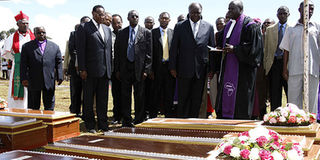Why ODM leaders missed Eldoret burial

Kenya's President Mwai Kibaki (C) pays his last respects to the victims of post-election violence in Kiambaa, on Thursday. At least 30 people died and dozens more injured - most of them children and women - when arsonists set ablaze to Kiambaa church in Eldoret on January 1, 2008 at the beginning of violence that later spread across Kenya in protest against the outcome of the December 27 presidential elections. Photo/REUTERS
The entire top ODM leadership on Thursday skipped the burial of victims of the arson attack on a church in the Rift Valley district of Eldoret during the post-election violence which had been billed as a reconciliation gesture between different communities.
Prime Minister Raila Odinga, deputy Prime Minister Musalia Mudavadi, Agriculture minister William Ruto, ODM national chairman Henry Kosgey and local MP Peris Simam, all failed to show up at the ceremony presided over by President Kibaki. The arson of the Eldoret church was one of the most brutal attacks of the post-election violence which followed the declaration of the 2007 presidential election.
Mr Odinga and Mr Ruto were in Nairobi where they held a meeting later in the evening. Mr Mudavadi had official engagements in Kericho Town. ODM sources said Mr Odinga, Mr Kosgey and Mr Ruto had not been invited to the event and that they only knew about it on Wednesday.
“That is why he decided that he was probably not needed there,” said the source who cannot be identified by name because of the nature of his work. Other sources said MPs from the central Rift Valley felt that they had already buried their victims of the post-election violence and Thursday’s event risked provoking emotions in the area.
Sources said: “There were very strong undercurrents on the ground. The people of the Rift Valley and the MPs wanted to know why the President did not attend the earlier burials of other victims.” This would make one of the communities appear as the aggressors, the source said.
“The people of Rift Valley and the MPs wanted to know why the bodies were not being taken to the cemetery. In fact word on the ground was that if the government erects a monument at the place, it would be destroyed.” And with their absence, reconciliation and permanent peace seems to be far from being achieved in the Rift Valley.
The 38 victims were burnt beyond recognition in the church at Kiambaa village, about six kilometres from Eldoret Town. The locals, mainly from the Kalenjin community, also skipped the funeral which puts to question the healing that the government claims to have done since the violence broke out after the year 2007 General Election that led to the death of more than 1,300 people and displacement of thousands of others.
Leaders who attended the funeral were mainly PNU leaning politicians, led by Internal Security minister George Saitoti, Special Programmes minister Naomi Shabaan, Gender minister Esther Murungi, Metropolitan minister Njeru Githae and MPs from Central province. The only MP present from the Rift Valley was Molo’s Joseph Kiuna.
Former President Daniel arap Moi sent his condolences through former nominated MP Ezekiel Barngetuny. Since the violence broke out, organisations including the Catholic Church have been carrying out peace meetings but most locals have been avoiding the functions.
During Thursday’s ceremony, Mr Wilson Yator from Burnt Forest, about 35 kilometres away, was chosen to address the function because local youths skipped the meeting. Addressing the gathering, President Kibaki said the country was on its way to achieving sustainable peace.
He said the government had a lot to achieve peace and the little that had not been done would be fulfilled soon. “The country is headed back to peace and those who had bad intention will not go far,” he said.
He said politicians usually talk “nonsense” and no one should heed their word. “Those who caused the violence have not gained anything and we should now keep peace,” the President said. He urged local people to concentrate on development since security had been beefed up in the area.
Prof Saitoti said 38 police stations, 100 police posts and Administration Police camps had been constructed to keep peace and those who had gone back to their homes should not worry. “Ministers, MPs, councillors and other leaders should also preach peace as we work together with the clergy to preach peace,” he said.
The Internal Security minister said the 2008 violence had tainted Kenya’s image. During the burial at the church grounds which have been converted to a memorial site, eight relatives fainted as the bodies of their loved were being lowered into the graves.
The victims had camped in the church to after fleeing their homes when it was doused with petrol and burnt. Another theory has been advanced that when youths were advancing to the church to eject them to look for an alternative place, the people inside the church trampled on a lamp setting on fire the church.
Relatives of the victims who had been preserved in a refrigerated container at Moi Teaching and Referral Hospital have been demanding that their loved ones be subjected to DNA tests before they could be buried, an exercise the State said was too expensive.




